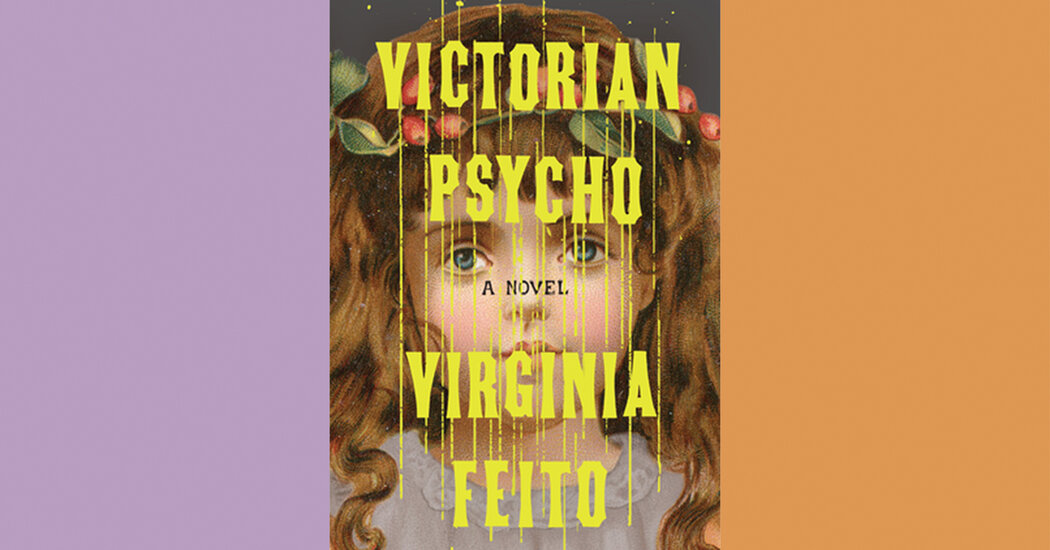VICTORIAN PSYCHO, by Virginia Feito
“Victorian Psycho,” the second novel by Virginia Feito, lives up to its literary namesakes, delivering unrelenting gore and shock in the vein of those earlier novels by Bret Easton Ellis and Robert Bloch. Everything the governess Winifred Notty sees in the world around her is transformed by the grotesque veil she lays over it, her imagination finding violent underpinnings and vile possibilities in even the most subdued, inoffensive moments.
Though the novel takes place in what seems like 19th-century England, Winifred is not the typical polite, virginal Victorian heroine, nor the rebellious feminist determined to chart her own course. She is a woman seeking revenge: not only for the wrongs that have been done to her personally, but for an entire society of oppressors and the people (often servants) who reinforce the system of subjugation.
Winifred arrives at Ensor House, a family estate “on a stretch of moorland” in the countryside, to care for the Pounds children: Drusilla, a sulky adolescent set on marrying even richer than her current class, and Andrew, a pompous child who regularly condescends to Winifred. She is invited to dine each night with their parents: a father who shows a lustful entitlement to the new governess and a mother who resents him for it.
From the time of Winifred’s arrival, it is evident that she has left a wake of destruction behind her, in the homes she’s worked in as well as the ones she was raised in. She obscures the nature of her previous dismissals and the fates of her past charges, and it appears her intentions at Ensor House are no different. Only a few pages in she announces: “It is early fall, the cold is beginning to descend, and in three months everyone in this house will be dead.”
By Christmas morning, Winifred is ready to wreak her stylish havoc on the extended family and friends gathered to celebrate. Artfully scattered throughout this grisly climactic sequence are some clues as to why she has arrived at the Pounds estate to showcase her talents in just this way.
Feito’s 2021 debut novel, “Mrs. March,” revealed her skill for eking out dread and terror from the mundane life of a woman past her prime — in that novel’s case, in mid-20th-century New York City. “Victorian Psycho” rushes to the opposite end of the spectrum, flooding each page with Winifred’s unrepentant, horrific cruelty. Winifred bites into the discarded face of a butchered calf. She tells her wards she is fat from eating fat children. She slices a baby’s throat, and then, thinking better of her mistake, rushes to a nearby farm to kidnap another baby to replace the blood-soaked infant before anyone can realize.
What’s consistent between the books is Feito’s macabre sense of humor. She has moved on from the pitiably self-conscious Mrs. March to the defiant, hallucinatory confidence of Winifred Notty: both deliciously unlikable in their own ways, both a pleasure to root for in their misguided travails.
Any attempt to justify the actions of a psychopath would be futile, but Feito does provide some insights into Winifred’s past that — like Patrick Bateman’s hollow life of privilege and Norman Bates’s obsession with his overbearing mother — provide helpful context for the character’s present state. We learn early on that the young Winifred suffered willful neglect and harm by her own caretakers, including her mother, and that she has a specific score to settle with this household in particular.
But the book defies such easy causation. As guests of the Poundses make casual conversation about a serial killer in the news, one claims that “good men such as ourselves could never get to the bottom of it,” for “evil can only be comprehended by evil.”
The discussion reminds Winifred of a “wicked” chicken her childhood servant told her mother about long ago: It pecked at all the other animals on the farm, gouging out their eyes and killing them. “‘What did you do?’ Mother asked. ‘What can tha’ do?’ the servant had replied. ‘Sometimes evil is born in one of the Lord’s creatures and there’s nowt to do about it, nowt at all.’”
Is Winifred’s evil innate, or inherited? Is her vengeance against the class and gender discriminations of her era warranted? With the blood bath that ensues, Feito leaves the reader wondering if the distinction matters at all.
VICTORIAN PSYCHO | By Virginia Feito | Liveright | 195 pp. | $24.99
